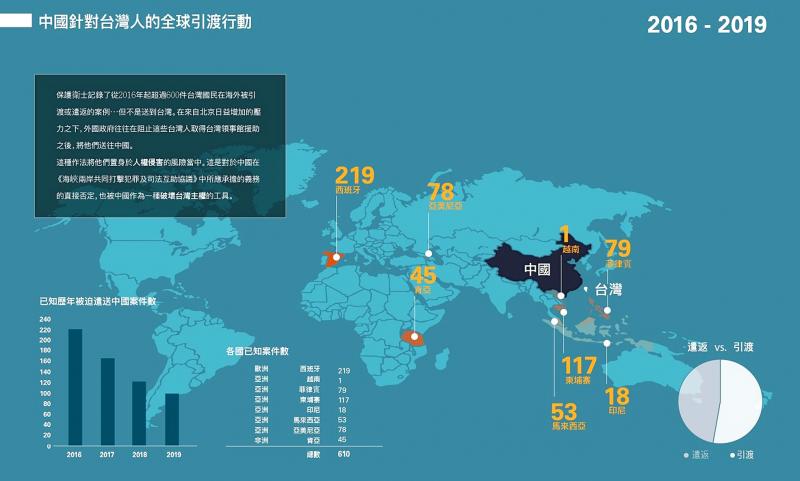About 610 Taiwanese nationals accused of crimes in other countries were extradited to China from 2016 to 2019, international non-governmental organization (NGO) Safeguard Defenders said yesterday, calling on the international community to intervene in the practice.
Based in Madrid, the organization is a human rights NGO founded in late 2016, its Web site says.
It released an eight-page report titled China’s Hunt for Taiwanese Overseas, which compiled data from news reports, government news releases and other sources available to the public.

Screengrab from Safeguard Defenders report.
“Through transnational repression and formal extraditions, the PRC [People’s Republic of China] is pursuing economic fugitives, Uyghur refugees, human rights defenders and fleeing Hong Kongers. But one group that has received far less attention to date: hundreds of Taiwanese nationals have been detained and forcibly extradited to mainland China from around the world,” the group said in a news release yesterday.
From 2016 to 2019, 610 Taiwanese nationals were extradited to China from around the world, including 219 from Spain, 117 from Cambodia and 79 from the Philippines, the report said.
The exact number might be larger, as the group had some difficulty obtaining data from Taiwanese authorities, Safeguard Defenders coordinator and researcher Chen Yen-ting (陳彥廷) told the Taipei Times by telephone.
Most of the extraditions of Taiwanese have taken place over the past five years, the report said.
“In many ways, the case in Kenya is emblematic of this change,” it said.
In 2014, China began pressuring Kenya over a group of more than 70 Chinese and Taiwanese nationals wanted for suspected telecommunications fraud, and in 2016 Kenya agreed to transfer some of them to China, it said.
“At least two of the Taiwanese nationals were later shown delivering televised forced confessions in China,” it said.
Straits Exchange Foundation and China’s Association for Relations across the Taiwan Straits in 2009 signed a Cross-Strait Joint Crime-Fighting and Judicial Mutual Assistance Agreement in which they agreed to cooperate on crime fighting, investigation and collection of evidence, apprehension and repatriation of convicted people, among other areas.
Beijing’s refusal to fulfill its obligations is arguably a response to what it sees as the more pro-independence mentality of President Tsai Ing-wen’s (蔡英文) administration, which came to power in May 2016, the report said.
“The extradition of Taiwanese nationals to China should be seen explicitly as a violation of their rights to a fair trial and to be free from torture,” the report said.
“The international community should take immediate steps to intervene in this practice,” it said. “This opposition doesn’t even have to wade into the politically charged ‘One China’ narratives.”
The global community should also allow Taiwanese representatives to participate in international forums, it said, adding that it is time for Taiwan to join the Interpol.

AIR SUPPORT: The Ministry of National Defense thanked the US for the delivery, adding that it was an indicator of the White House’s commitment to the Taiwan Relations Act Deputy Minister of National Defense Po Horng-huei (柏鴻輝) and Representative to the US Alexander Yui on Friday attended a delivery ceremony for the first of Taiwan’s long-awaited 66 F-16C/D Block 70 jets at a Lockheed Martin Corp factory in Greenville, South Carolina. “We are so proud to be the global home of the F-16 and to support Taiwan’s air defense capabilities,” US Representative William Timmons wrote on X, alongside a photograph of Taiwanese and US officials at the event. The F-16C/D Block 70 jets Taiwan ordered have the same capabilities as aircraft that had been upgraded to F-16Vs. The batch of Lockheed Martin

GRIDLOCK: The National Fire Agency’s Special Search and Rescue team is on standby to travel to the countries to help out with the rescue effort A powerful earthquake rocked Myanmar and neighboring Thailand yesterday, killing at least three people in Bangkok and burying dozens when a high-rise building under construction collapsed. Footage shared on social media from Myanmar’s second-largest city showed widespread destruction, raising fears that many were trapped under the rubble or killed. The magnitude 7.7 earthquake, with an epicenter near Mandalay in Myanmar, struck at midday and was followed by a strong magnitude 6.4 aftershock. The extent of death, injury and destruction — especially in Myanmar, which is embroiled in a civil war and where information is tightly controlled at the best of times —

Taiwan was ranked the fourth-safest country in the world with a score of 82.9, trailing only Andorra, the United Arab Emirates and Qatar in Numbeo’s Safety Index by Country report. Taiwan’s score improved by 0.1 points compared with last year’s mid-year report, which had Taiwan fourth with a score of 82.8. However, both scores were lower than in last year’s first review, when Taiwan scored 83.3, and are a long way from when Taiwan was named the second-safest country in the world in 2021, scoring 84.8. Taiwan ranked higher than Singapore in ninth with a score of 77.4 and Japan in 10th with

China's military today said it began joint army, navy and rocket force exercises around Taiwan to "serve as a stern warning and powerful deterrent against Taiwanese independence," calling President William Lai (賴清德) a "parasite." The exercises come after Lai called Beijing a "foreign hostile force" last month. More than 10 Chinese military ships approached close to Taiwan's 24 nautical mile (44.4km) contiguous zone this morning and Taiwan sent its own warships to respond, two senior Taiwanese officials said. Taiwan has not yet detected any live fire by the Chinese military so far, one of the officials said. The drills took place after US Secretary